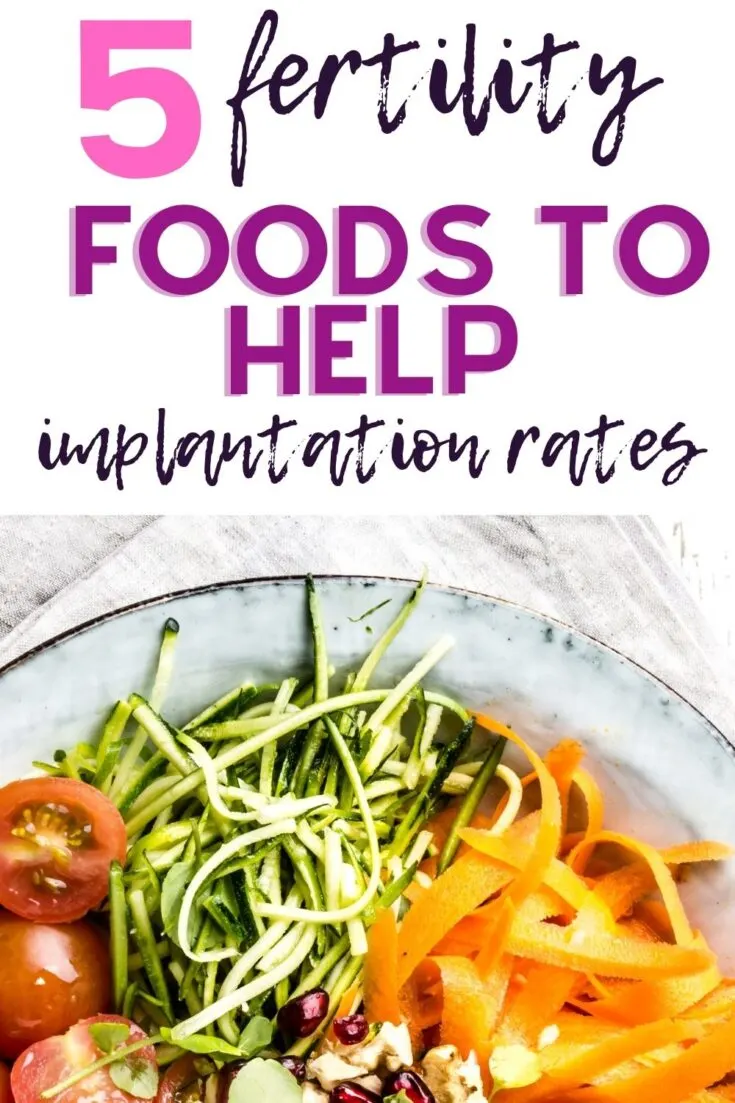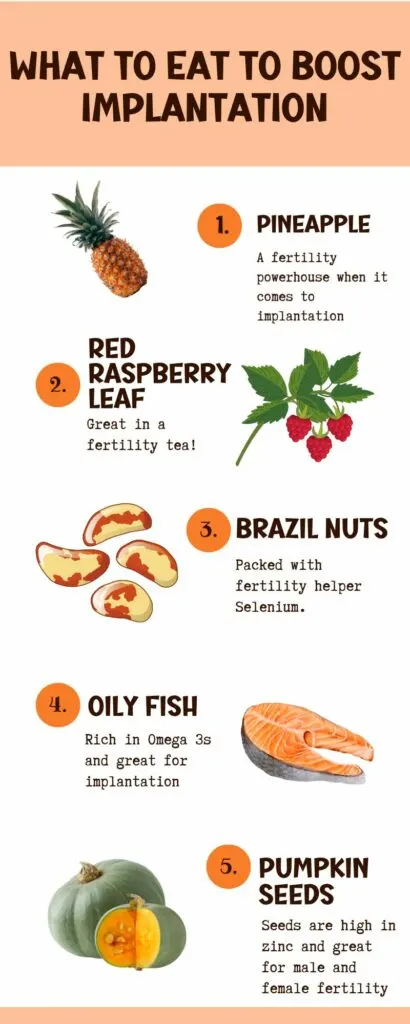Did you know that there are specific foods that you can eat to help implantation?
While there is no one “magic food” that will guarantee success, incorporating some of these foods into your diet may increase your chances.
Whether you are tracking your ovulation or are preparing for IVF, there are some foods to help implantation that you can incorporate into your diet.
You may have considered improving your egg quality and making sure your partner’s sperm is in top-tip condition but preparing your uterus for implantation is another essential step when increasing your chances of getting pregnant.
Although we often think about implantation rates when we talk about IVF or FET (frozen embryo transfers) improving your chances of implantation is important for everyone who wants to get pregnant.
Below you will find 5 foods to help implantation by increasing blood flow to the uterus and toning it in preparation for pregnancy.
I’ve also got tips on the foods you should avoid plus the best drinks to help implantation.
You can also sign up for a free fertility lists and grocery planner.
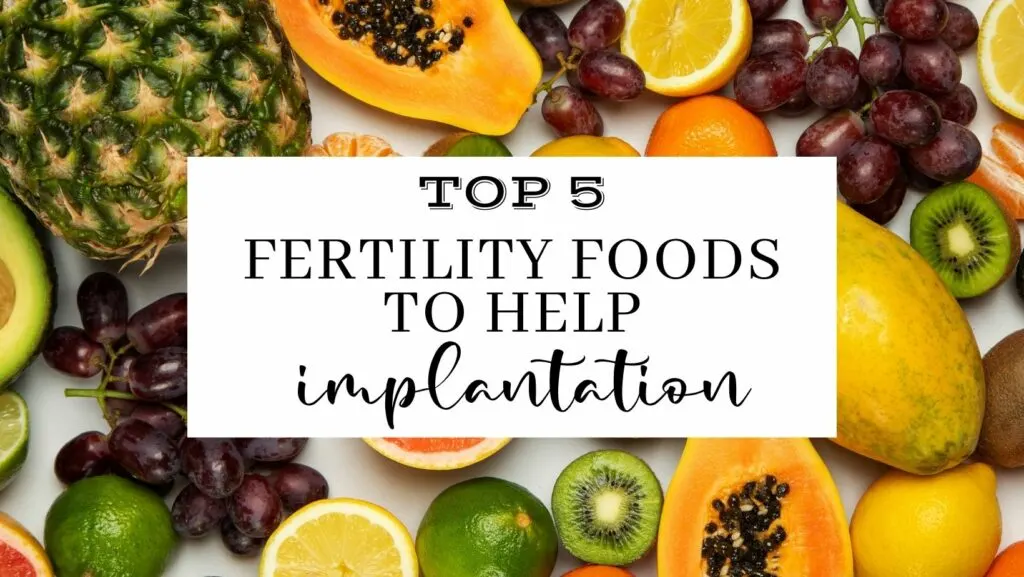
This post may contain affiliate links meaning I make a commission if you click on a link. Please read my Disclosure for more details.
MORE FERTILITY TIPS
Should You Do A Fertility Detox To Get Pregnant ?
The Best Smoothie Bowl For Fertility (Low carb, high protein!)
When Should You Eat Fertility Foods?
You might think to only eat the implantation foods below after ovulation but for best results, you should be incorporating them for months before you want to get pregnant.
Aim to include each food in your diet a few times a week for at least 3 months before your IVF transfer or before starting to try for pregnancy.
It can take up 90 days for your eggs to reach maturity so you need a full 3 months of eating these implantation foods to really see results.
5 Amazing Foods To Help Implantation
Certain foods are thought to help improve the chances of embryo implantation, and eating them may increase your chance of success.
Read on to learn the best foods for implantation!
Pineapple
People have been associating pineapple and fertility for years, and with good reason.
Pineapples are an awesome fertility food because they are widely available and affordable for most people.
An enzyme called bromelain is the reason pineapple has become a symbol of fertility Worldwide.
Bromelain is known as a blood thinner so it likely works in the same way as a baby aspirin for improving implantation.
Blood thinners help to drive the blood to the uterus and encourage implantation and possibly prevent miscarriage.
Although pineapples are naturally sweet and delicious, the part with the highest concentration of bromelain is the tough, pineapple core which is not that enjoyable to eat.
To make it more palatable, try adding it into my Pineapple Implantation Smoothie
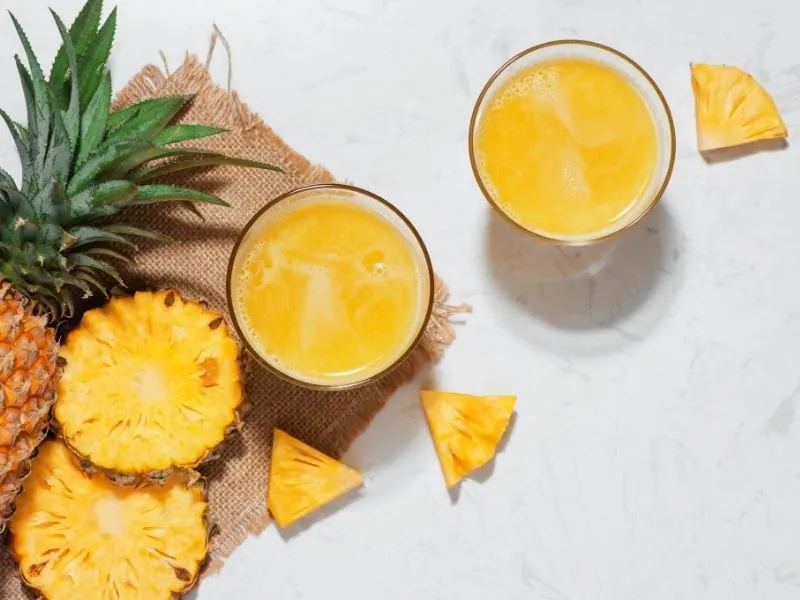
Red Raspberry Leaf
Midwives have prescribed red raspberry tea for centuries as a way to encourage labour in late pregnancy.
Ironically, this wonder herb can also help you get pregnant in the first place.
Known as a fantastic uterine tonic that improves blood flow to the pelvic area, it is one of the best foods that help implantation.
Red raspberry leaf is most commonly taken as a tea or infusion like the Stork Conception Tea.
Make sure to stop taking red raspberry leaf as soon as you get a pregnancy test as it can cause uterine contractions (which is why it is used in late pregnancy).
Brazil Nuts
Brazil nuts are one of the best sources of a mineral called selenium. For optimum intake, aim to eat a couple of brazil nuts every day.
Not only is selenium a powerful anti-oxidant which may protect against certain cancers, anti-oxidants are also great for egg quality.
For more tips on improving your egg quality, make sure to download this free ebook from the fertility experts at Fertility Coach.
Another benefit of selenium is that it may thicken the uterine call and improve your chances of implantation.
Like pineapple, brazil nuts can also help to thin the blood. This can reduce your chances of a miscarriage by preventing blood clots.
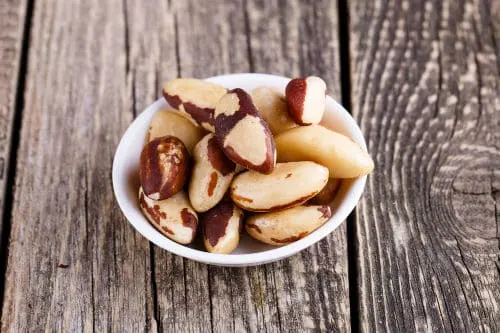
Oily Fish
When you are looking for foods to support implantation, Omega 3s rich foods should be top of your list.
That’s why no implantation diet is complete without some oily fish.
These fish are rich in Omega 3 fatty acids which have a positive affect on both egg quality and general reproductive health.
Numerous studies have shown that have shown that fatty acids are important in early reproductive events including egg maturation and embryo implantation.
Foods that are rich in Omega 3 Fatty acids include oily fish such as salmon, mackerel and sardines.
Just beware to not overdo the fish that are high in mercury.
They also make a great addition to a more complete fertility diet as they are great sources of protein.
If you don’t eat fish, another option is walnuts but be sure to buy them in their shell and crack them yourself to ensure freshness.
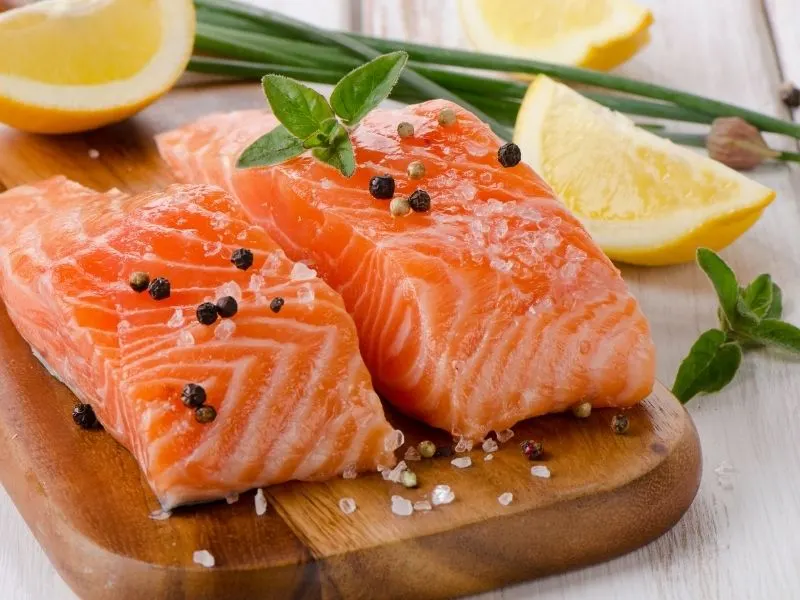
Pumpkin and Sunflower Seeds
Iron-rich foods are very important if you are trying to get pregnant.
These are foods that support implantation by boosting blood supply to the uterus and helping to build up the uterine lining.
Pumpkin and sunflower seeds are great blood building foods.
You can easily add them into dishes or just have them as a quick snack on the go.
Sesame seeds are also high in iron if you like them in tahini or in salads.
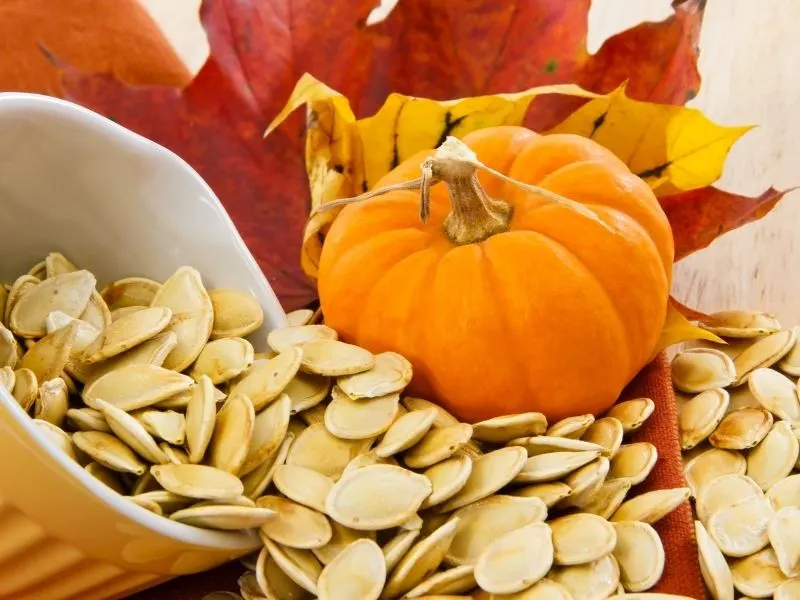
Foods that help with implantation
For a quick cheatsheet on what foods help with implantation, you can save the image below or pin it to Pinterest.
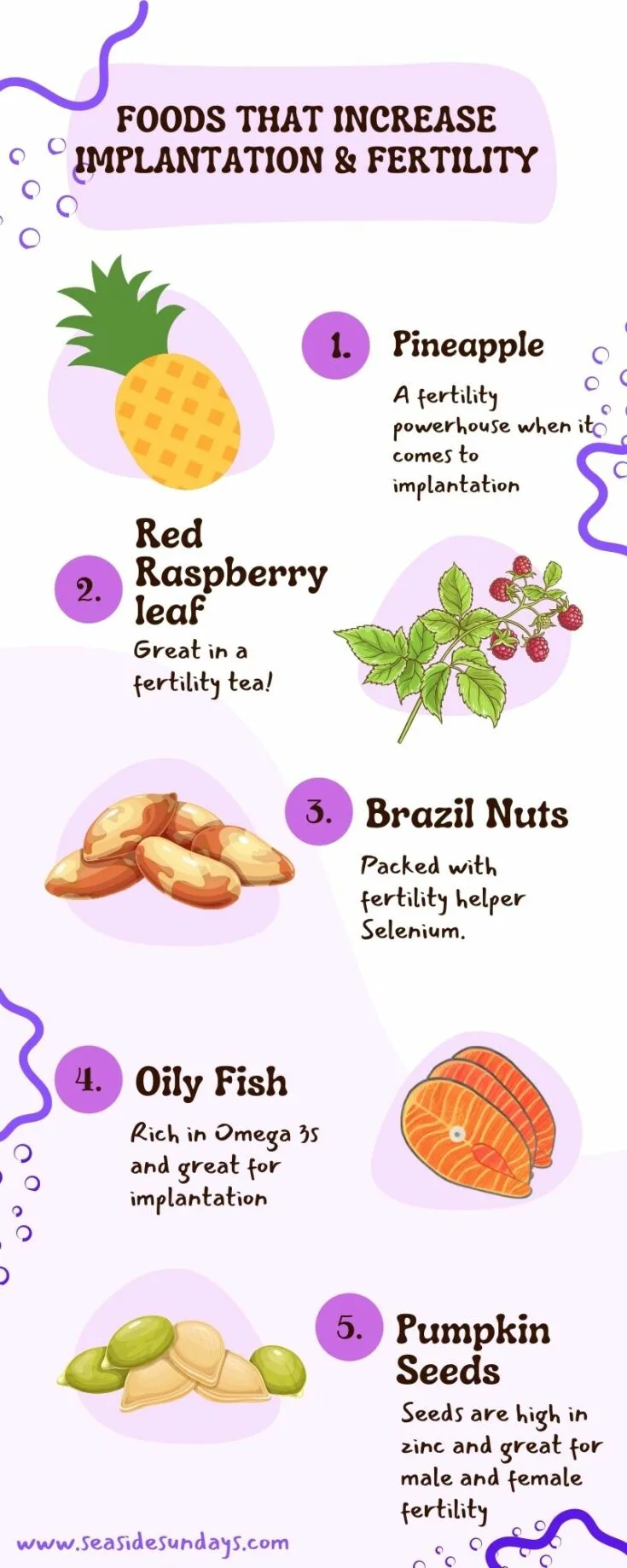
Nourishing Your Way to Successful Implantation
Now you know the best foods to help with implantation, let’s take a look at the top nutrients to include in your implantation diet on a weekly basis.
5 Key Nutrients that are good for implantation
Folic Acid
This essential B vitamin plays a crucial role in fetal development and helps prevent neural tube defects.
Boost your intake with leafy greens, citrus fruits, beans, and fortified grains.
Omega-3 Fatty Acids
Found in fatty fish like salmon, sardines, and mackerel, as well as flaxseeds and walnuts, these healthy fats promote a healthy uterine lining and support embryo implantation.
Vitamin E
Known for its antioxidant properties, vitamin E helps improve blood flow to the reproductive organs.
Incorporate sources like almonds, spinach, sunflower seeds, and avocados into your diet.
Hydration for Implantation
It might seem strange but in addition to implantation foods, there are implantation drinks too!
Water
Staying hydrated is essential for optimal fertility.
It helps maintain a healthy cervical mucus consistency and supports the transport of nutrients to the reproductive organs.
Aim for at least 8 glasses of water per day.
Green Tea
Known for its antioxidant properties, green tea contains catechins that may help improve fertility.
However, limit your consumption to a moderate amount (1-2 cups per day) to avoid excessive caffeine intake.
Raspberry Leaf Tea
This herbal tea is often touted for its potential benefits in supporting the uterus and preparing it for implantation.
Consult with your healthcare provider for the appropriate dosage and timing as it is important not to take it after ovulation.
Other Teas
There are actually quite a few other herbal teas for fertility that you can try to boost your chances of pregnancy.
Foods For Implantation FAQs
How can I increase my chances of implantation?
Don’t worry about trying to eat perfectly, just try to eat clean (non-processed foods).
Simply, try to have a variety of different types of whole foods: vegetables, fruits, and fats.
— Maternal Resources (@IntegrativeOB) February 9, 2022
What Foods Should I Avoid For Implantation?
Most doctors will agree that there are some foods that definitely don’t help fertility.
Too many processed foods, white sugar products and a low protein, high carb diet likely won’t do you any favours.
Some other foods that can hinder your ability to get pregnant include:
High-Glycemic-Index Foods (rice, pasta, sugar products)
Soda and Pop – I’ve written before about soda and fertility. Realistically, it is beneficial to drop your soda habit when you are TTC.
Soda is full of empty calories and offers no nutrition at all, even the diet brands should be avoided due to the artificial sweeteners.
Trans Fats – Most of us know by now that trans fats can cause a whole host of health issues from heart disease to obesity.
Here is a table to help you decide what not to eat when trying to get pregnant:
| Worst Foods for Implantation | Why You Should Avoid Them |
|---|---|
| Processed Foods | These foods are typically high in unhealthy trans fats, artificial additives, and excessive sodium.
They contribute to inflammation in the body, which can disrupt hormonal balance and impair proper implantation. Additionally, they often lack essential nutrients needed for fertility. Opt for whole, unprocessed foods instead. |
| High-GI Index Foods | Foods like sugary snacks, white bread, and refined grains cause a rapid spike in blood sugar levels, leading to an increased release of insulin.
Elevated insulin levels can interfere with ovulation, disrupt hormone production, and negatively impact implantation. Choose low-glycemic index options such as whole grains, legumes, and vegetables. |
| Caffeine | Consuming large amounts of caffeine, such as multiple cups of coffee or energy drinks, can impair fertility and hinder implantation.
Caffeine can interfere with hormone production, reduce blood flow to the reproductive organs, and increase the risk of miscarriage. It’s best to limit caffeine intake and opt for decaffeinated beverages or herbal teas. |
| Alcohol
|
Alcohol negatively affects fertility by disrupting hormone levels, impairing ovulation, and reducing sperm quality.
Excessive alcohol consumption can lead to nutritional deficiencies and disrupt the delicate balance necessary for successful implantation. |
According to a study from the Harvard Medical School;
” …women who consumed two percent of their daily calories in the form of trans fat—which translates to four grams of fat for a woman eating 1,800 calories a day—exhibited a 73 percent greater chance of developing ovulatory infertility than those who consumed those calories in the form of carbohydrates.”
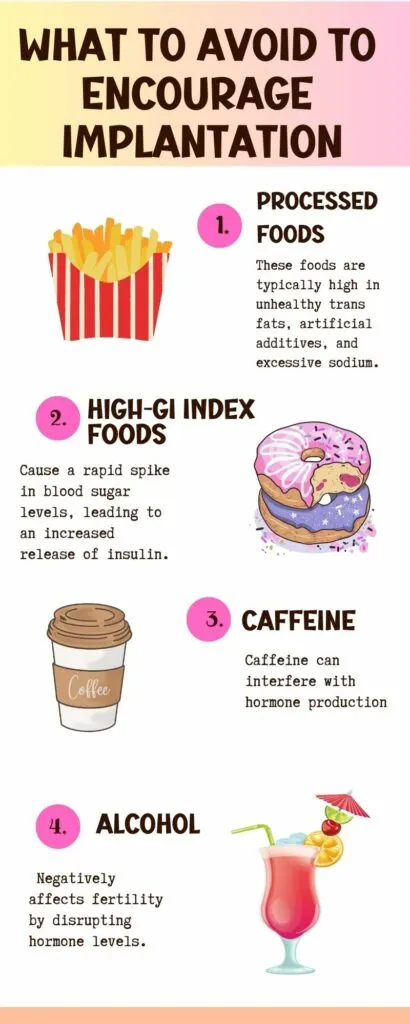
The bottom line on foods to avoid for optimal fertility?
Try and eat as many whole foods as possible and limit your intake of processed, packaged foods when you are trying to conceive.
Research on the best kind of diet to eat for fertility can be summarized as avoid processed and junk foods. #IVFCanada #1in6
— Fertility Matters Canada (@FertilityMattrs) October 29, 2015
What Fruit Helps Implantation?
The fertility fruit, pineapple should be your go-to when it comes to fertility foods. The bromelein is thought to help with blood flow in the uterus which can help increase your chances for success implantation and that all important BFP.
Another powerhouse fruit is pomegranate. Pomegranates contain high levels of antioxidants that help support egg health and thus your chances of implantation.
You can eat pomegranate seeds or add the juice to soda water or your fertility breakfast smoothie.
What Other Foods Can You Try for A Successful Implantation?
If you visit a doctor who practises Chinese medicine, you are likely to hear about the importance of a warm womb.
There is a whole school of thought that believes that eating only warm (eg. not ice cold) foods can help with implantation and fertility.
So what are the best warm foods for implantation?
The easiest way to incorporate warm foods into your diet is to make swaps like you probably do do in the winter.
Instead of a salad, try a vegetable soup, for example.
My acupuncturist also recommended that I stopped drinking ice water and kept my drinks either room temperature or hot.
Drinking lots of nice fertility teas can be very comforting and can even be beneficial to your fertility.
Consider trying the following foods:
- Bone broth
- Soup
- Herbal teas
- Casseroles
- Stews
- Chili
- Chowders
What to eat after ovulation to help implantation
To support implantation after ovulation, focus on foods that promote a healthy uterine lining and hormonal balance.
Incorporate nutrient-rich options such as leafy greens, berries, lean proteins, whole grains, and healthy fats like avocado and nuts.
Additionally, include foods high in folate, omega-3 fatty acids, and antioxidants.
Stay hydrated and consider herbal teas like raspberry leaf.
Remember, a balanced diet and proper hydration provide the foundation for optimal conditions for successful implantation.
Foods To Help Implantation: Final Thoughts
Remember, incorporating these fertility-boosting foods into your diet is a great step toward enhancing your chances of successful implantation.
However, it’s always important to consult with a healthcare professional or fertility specialist to personalize your nutrition plan based on your specific needs and medical history.
Happy eating and baby dust on your journey to conception!
FREE Fertility Resources (Ebooks, Checklists and more)
Click the links to instantly download the following useful resources, at no cost!
FREE Ebook: How to Improve Your Egg Health
FREE Report: How To Improve Sperm Health
Report: Preventing Miscarriages
FREE Ebook: Restore Fertility & Get Pregnant Naturally
Free Checklist for IVF
More Tips & Foods To Help Implantation
5 Herbal Teas To Increase Fertility Naturally
The Best Foods That Increase Fertility
Fertility And Caffeine – Is It Really That Bad?
